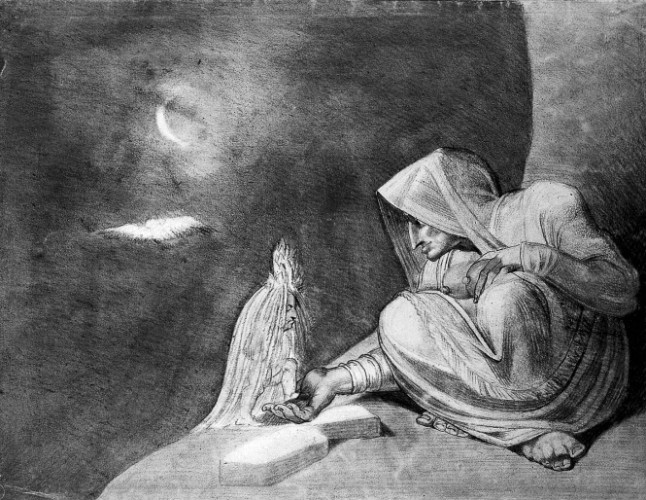We are a bit spoiled for choice, in the English language. When we need a word, and another language has one that’ll do the job, we’re quite happy to appropriate it – words like schadenfreude, or (my personal favourite) l’espirit de escalier (“the spirit of the staircase”, which is the French term for that moment that you come up with a cunning riposte, moments (or hours) after it’s too late.

But, crucially for the discussion I’m about to have with myself, and that you can see right here, right now, on the screen of the device of your choice, is about synonyms. And then we’ll get into the cool stuff people should put into their fantasy novels bit. That’s coming, I promise. And this little bit about synonyms leads directly into it.
It’s not much of a tangent.
Now, the synonym group that I want to talk about in particular are words that are related to practitioners of magic.
We’ve got so many words in English that cover what seems (to us) to be a hugely diverse field of professional magic users. But, in other languages, they don’t have these divisions of labour in magic, which can lead to some interesting cultural views on what, exactly constitutes magic (this is what we’re going to talk about, through a historical lense). Firstly, because I love the English language, and the idea of synonyms, as well as the concept of professional magic users, let’s set out a list of the words we can use in English to describe them:
Magician
Witch
Wizard
Sorcerer
Warlock
Necromancer
Magi
Mage
Enchanter
Thaumaturge
And I’m sure there are others – tell me if you think I’ve missed any.
Basically, the point I’m trying to make is that, in English, we’ve got these distinctions between what, in many other languages, would be the same thing. In English, they’re not really synonyms – an Enchanter, for instance, uses illusions; a Necromancer raises the dead; a Sorcerer launches magic missiles; and a Witch uses herbs and what-not, traditional for both good and evil.
And these distinctions let us think about magic users in different ways. Most of my readers will have at least a passing knowledge of the Bible, so I’ll use that as an example: in the original Hebrew and Aramaic, there are forty-four uses of the word ‘chakam’ , which translates directly to ‘wise men’, but is translated in the King John version to mean a variety of words in English, like ‘magicians’, ‘astrologers’, or ‘soothsayers’. In the New Testament, the three wise men of Matthew are referred to as being ‘magos’ (which we’ve translated as ‘wise men’). In Acts, however, the term ‘magos’ is also used to describe Elymas, and our translations read ‘sorceror’.
So, in a rather round-about way, we’ve come to what I wanted to talk about: was there a distinction between all these varieties of ‘chakam’ or ‘magi’ (it’s the plural of ‘magos’)?
The evidence points to ‘probably not’.
Let’s start with something I’m incredibly interested in: Ancient Mesopotamian witchcraft.
Now, for the Sumerians (one of the peoples who kicked off this fuss that we call ‘civilisation’), there was absolutely no distinction between the powers of their gods, the powers of sorcerers, between prophecy and portents. Demons and ghosts afflicted them daily. Magic, science, medicine, religion…all of these things, to the people of Sumer, fell under the same heading.
I guess, to make this already-long story short, what I’m talking about here are world-views. The Sumerians counted in base 12. Base 12! What the flip is that all about? We’ve got ten fingers, which is the reason that is often posited as why we count in base 10. The Sumerians counting in base 12 is the reason why we divide the day into two periods of 12 hours, by the way – and seconds and minutes and all that jazz.
It’s like fantasy novels that are set in these mirror-Medieval Europes. There are so many interesting and alien world-views right here on this damn rock, all you need to do is take a look. There are matriarchal societies that destroy the myth that in primitive societies men were in charge because men are the protectors. It’s just your view that makes it seem like those two things have a causal relationship.
Farber, W., Witchcraft, Magic, and Divination in Ancient Mesopotamia
Filed under: fiction, Non-fiction Tagged: Dark Fantasy, fantasy, history, Magicians, New Weird, religion, Science Fiction, Sorcerers, Speculative Fiction, Weird History, witches, wizards, World-view, writing, writing prompts



















